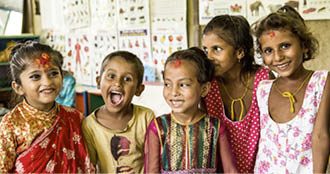The Non-Profit That’s Fostering Sustainable Access to Books and Education in Rural Asia
By Sara Grochowski

Today, READ has global headquarters in San Francisco, local country offices in Bhutan, India and Nepal. More than 2 million people have access to READ Centers and their trainings.
READ Global’s impact boasts 2.5 million rural villagers with access to community library and resource centers, 107 centers established to date, 184 for-profit enterprises launched to sustain those centers, and 418 villages served by centers – and it’s likely you still haven’t heard of this non-profit organization working in rural Asia and headquartered in San Francisco.
The organization was “inspired by a simple wish from a Nepalese trekking guide: to have a library for his village.” Dr. Antonia “Toni” Neubauer, a former language teacher and education researcher, founded the Rural Education and Development (READ) Global in Nepal in 1991 after traveling throughout Asia for decades with her adventure travel company Myths and Mountains. In 2006, READ Nepal won the Bill & Melinda Gates Foundation’s Access to Learning Award and, the next year, received a Replication Grant from the Foundation to expand its reach to Bhutan and India. Today, READ Global is headquartered in California with local offices in Bhutan, India, and Nepal.
READ Global has four programs: Education, Women’s Empowerment, Technology, and Economic Empowerment. READ Centers provide “holistic education for villagers of all ages and backgrounds,” including adult literacy courses, information about preventative health, children’s programming, youth support through the loaning of textbooks, materials, and support. The centers offer women and girls “a safe space to gather, learn, and advocate,” providing leadership development, women’s and family health, gender sensitization training and discussions, and women’s groups from book groups to saving cooperatives. In addition to functioning as a community space, the centers provide free access to “computers and the internet, where possible, as well as trainings in information communications technology.” And, finally, the centers provide “educational resources and training programs focused on creating livelihoods and building financial literacy.”
All READ centers are owned and operated by the local community and has a library, computer room, women’s section, children’s room, and training hall. Local partners offer training in each of the four programs and each center includes a for-profit “sustaining enterprise,” a small business that creates local jobs and generates profit to support the ongoing costs of the center.
This savvy four-pronged approach provides equitable access to knowledge, helping isolated rural communities sustainably break the cycle of poverty by empowering individuals within the community, including women, children, and the elderly. READ Centers are libraries that change lives.
READ Global offers numerous ways to get involved at readglobal.org.

Continue Reading…
Article originally Published in the October/November 2019 Issue “Read Global”
